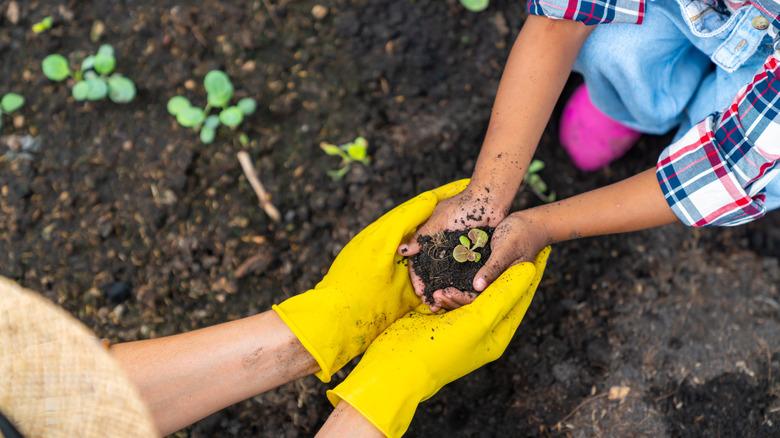Add These Flowering Plants To Your Garden To Improve The Quality Of Your Soil
At first glance, it's easy to think of soil as something that simply keeps plants in place. But if you're on a mission to grow a flourishing garden, it's worth considering the quality of your soil. Think about it: Soil provides essential nutrients for plants, ensuring they can properly grow and develop. This includes nutrients like nitrogen, phosphorus, and calcium, according to the Penn State Extension. Additionally, soil influences water drainage and aeration around the plant's roots, affecting its overall health. Soil is also home to a diverse community of microorganisms, such as bacteria and fungi, which release nutrients for plants, according to Ohio State University Extension.
All that said, factors like texture, structure, pH levels, nutrient content, and microbes determine the quality of soil — and ultimately, the success of your garden. There are many ways to improve soil quality, such as using garden soil amendments and learning how to adjust soil pH. Another option is to incorporate flowering plants that improve soil quality and the productivity of your garden. This approach will allow you to naturally enhance your soil while decorating your outdoor space; it's a win-win situation.
To learn which flowering plants can boost soil quality, Hunker reached out to Ashley Esakin, a soil expert with a B.Sc. in soil science and is a YouTuber for Gardening in Canada, for exclusive insight on the best options. As it turns out, certain flowering plants can benefit the soil due to their root systems and types, so long as you choose the right ones.
What flowering plants improve soil quality?
Understandably, you may be tempted to choose plants based on the visual appeal of their flowers. However, soil expert Ashley Esakin exclusively told Hunker that it's best to select plants with varying root systems if you'd like to improve soil quality. She provided examples: "Lilies have a bulb that can fracture soil horizontally," shared Esakin. This can help break up soil, allowing for better water drainage and airflow around plant roots. You can also grow salvia. "Salvia has a bunching root system that will add organic material ([microbial] fuel)," Esakin explains. Salvia will also add a pop of color to your garden, as it produces dramatic upright flowers in vibrant shades of purple, pink, and blue.
Are you a fan of large, eye-catching blooms? Learn how to grow sunflowers, which "...have a tap root to break up the soil levels," Esakin told Hunker. Meanwhile, "Iris is good for soil stability due to its rhizomes," she adds. Soil stability is important because it determines the physical composition of the soil, ensuring it has a strong structure that can support plant growth, according to Ohio State University Extension.
Flowering plants for specific soil needs
If you have more specific soil needs or goals, there are different types of flowering plants you can add to your garden. For example, if you'd like to enhance soil quality over an entire yard, go for clover flowers and nitrogen-fixing plants, as soil expert Ashley Esakin exclusively told Hunker. For example, dandelions have a tap root that benefits soil structure while drawing nutrients up from the lower levels of the soil, she said. "Thyme is a good soil stabilizer," Esakin added.
Alternatively, if you've got your eye on long-term soil improvement, you can choose between annuals or perennials. "It depends on what your goal is," said Esakin. "If you are looking to stabilize the soil and reduce runoff, then a perennial is going to be the better option." On the other hand, if you'd like to create soil that can be used differently year after year, then annuals are the way to go, explained Esakin.


